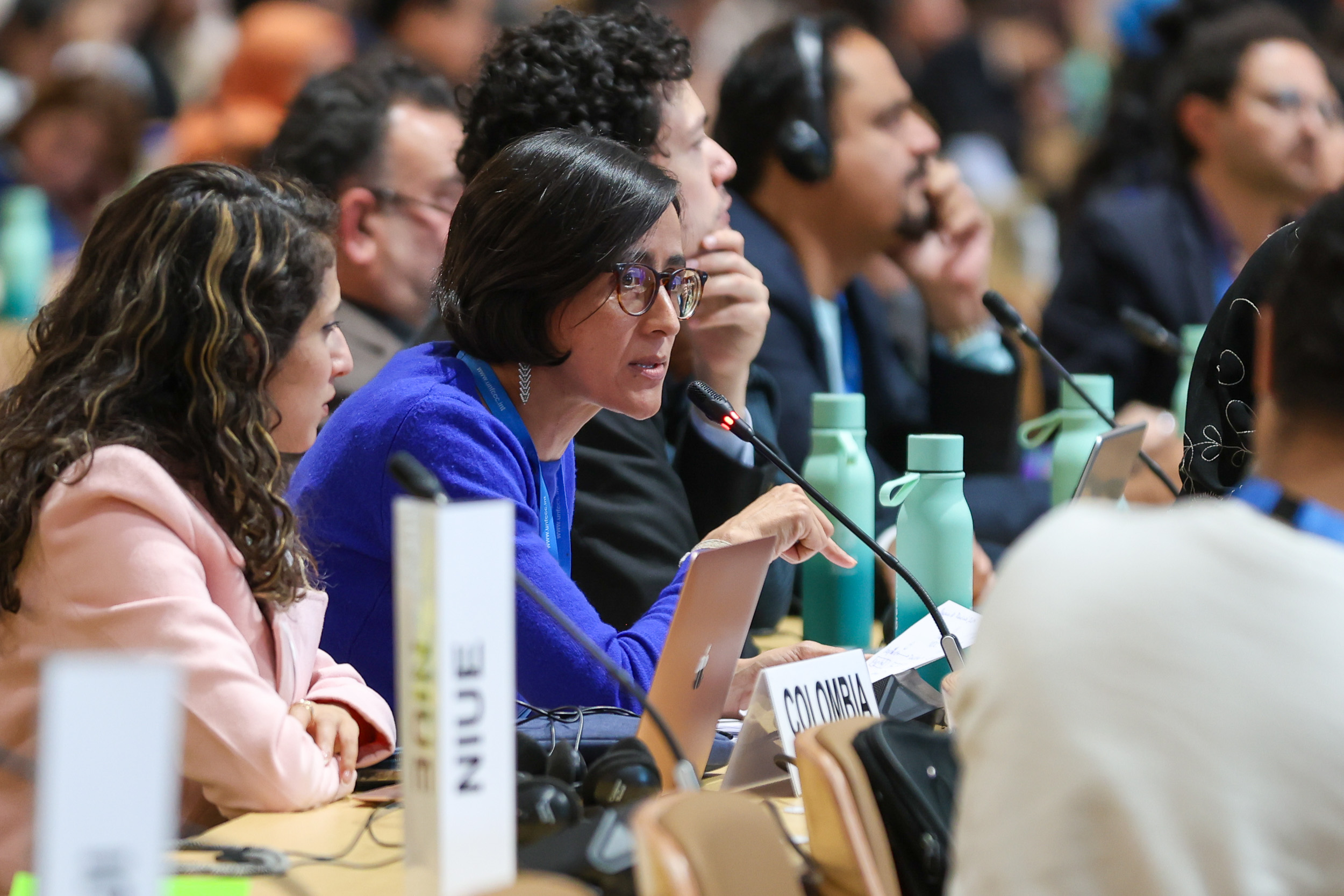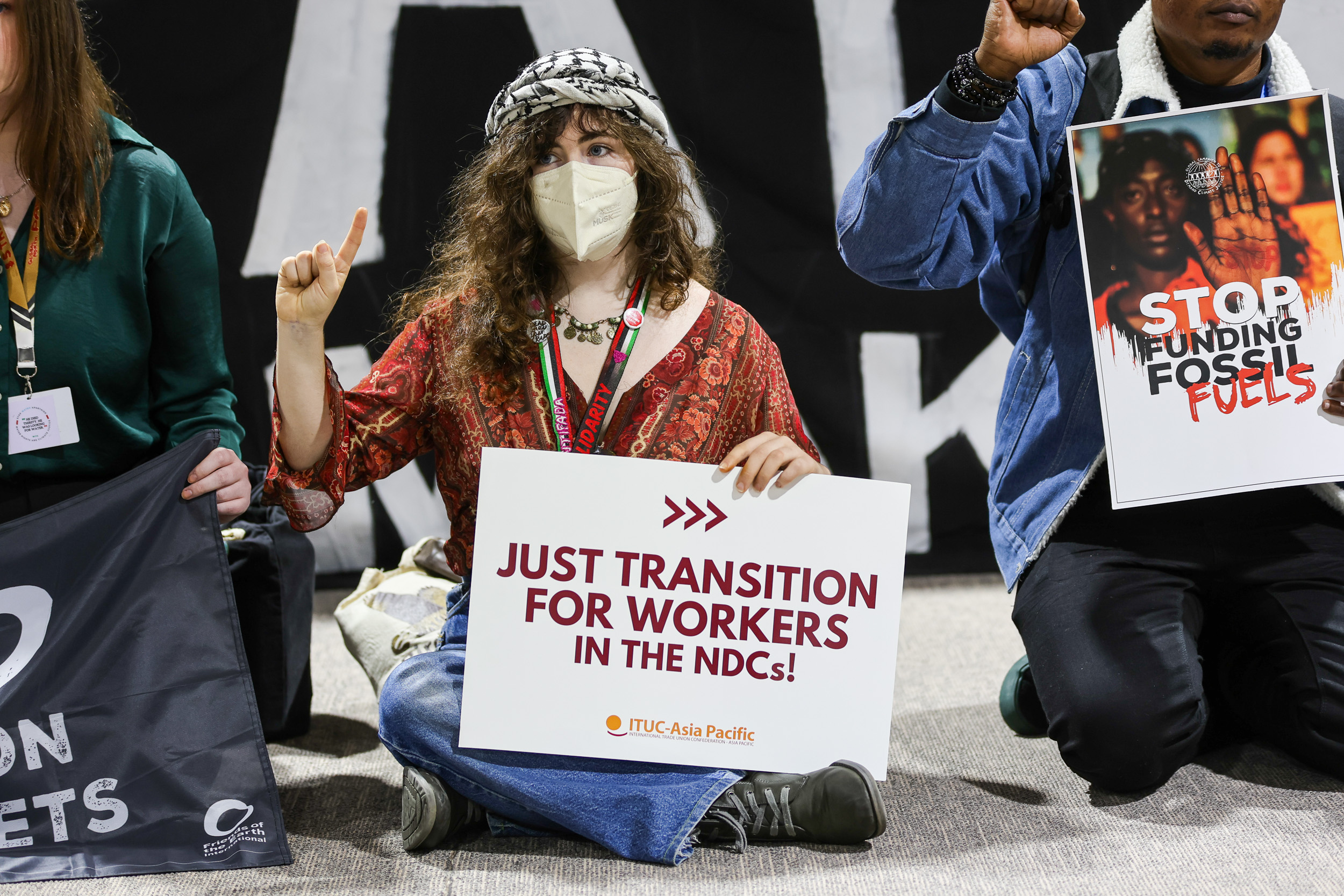COP 29: Exploring Engagement Strategies for a Just Transition in the Global South
A panel of expert speakers joined us at COP 29 in Baku, Azerbaijan, to discuss...

At COP 29, delegates from member parties convened to advance discussions on the Just Transition Work Programme (JTWP), a framework established at COP 27 that had its foundational elements agreed at COP 28. The focus this year was to further develop the programme by defining additional features and practical pathways for implementation.
The first year of the work programme saw two dialogues, held in June and October, on how just transition pathways can be integrated into nationally determined contributions (NDCs), national adaptation plans (NAPs), and long-term low emission development strategies (LT-LEDS), and how focusing on a whole-of-society approach and the workforce can support people-centric and equitable just transition pathways.
The negotiations at COP 29 built on an informal note developed this June during the 60th Sessions of the United Nations Framework Convention on Climate Change (UNFCCC) Subsidiary Bodies (SB60) in Bonn, where the parties had failed to agree on a more substantive text.
To better understand the outcomes and the process, we followed the formal consultations in person and spoke to a range of delegates and observers from different party groups, gathering their perspectives on the challenges, the achievements, and the road ahead.
COP 29 ended without a formal decision on the JTWP. Under Rule 16 of the UNFCCC Rules of Procedure, unresolved items from the agenda automatically roll over to the next ordinary session, meaning that discussions will resume at SB62 in Bonn in June 2025.
The first week began with informal consultations under a contact group, but by Saturday, no agreement had been reached, and no draft text was forwarded to a plenary held on that day (it was agreed, however, that the topic would be considered further during the following week). On the Thursday of the second week, the presidency, following informal consultations and building on the text that had not been agreed on by the previous Saturday, released a text with multiple options addressing politically sensitive topics. This was followed by a final draft on the following day—the conference’s scheduled end date—which left a key option tied to global stocktake (GST) outcomes unresolved.
Most of the developed countries seemed to view the final draft as a reasonable compromise, noting that it included several elements that developing countries had advocated for: a stronger emphasis on just transition and adaptation; clear references to common but differentiated responsibilities and respective capabilities (CBRDCs); the role of international partnerships; and a process to begin the discussion of concrete outcomes. Developed countries also strongly prioritised explicit references to NDCs, NAPs, LT-LEDS, and GST outcomes, with agreement also expressed by several developing countries, including groups like the Alliance of Small Island States (AOSIS) and Independent Alliance of Latin America and the Caribbean (AILAC). However, the inclusion of these references was unlikely to be a deal-breaker for developed countries due to the collective will to reach a decision.
Several delegates from developing countries, alongside civil society observers, acknowledged additional progress, including references to broad stakeholder inclusion as part of social dialogue, the role of small and medium-sized enterprises (SMEs), and a focus beyond the existing workforce. The draft also sent a political signal that the JTWP can and will yield tangible results. However, significant sticking points remained, leading to what was widely considered to be an unbalanced text. Many developing countries expressed dissatisfaction with the lack of references to free trade and the absence of a comprehensive just transition guidance framework. Groups like the Like-Minded Developing Countries (LMDC) and the Arab Group also strongly opposed references to GST outcomes, seeing this as an attempt to change the scope of the work programme.
As negotiations dragged into the second Saturday, expectations for a procedural decision, which would have safeguarded some of the progress made and outlined a clearer path forward, rose among many parties. Instead, in a move surprising to some delegates at such a late stage, Rule 16 was invoked late on Saturday night, without the formal consultation that could have led to an alternative outcome.

The negotiations were widely criticised for being slow, top-down, and exclusive. Delegates raised concerns over the lack of informal, party-to-party negotiations on the technical level, the absence of which they felt prevented constructive engagement. Instead, the process relied on informal group settings and bilateral consultations, which allowed parties—legitimately—to present their positions, but were seen to hinder the ability to find common ground and overcome ongoing differences. Such processes also made it challenging for observers to follow the discussions, lacked transparency and limited the possibilities for deep engagement.
While it was understood that the presidency initially considered just transition as one of its priorities (it was always clear that finance would be the main issue for this COP), its prominence waned as discussions on other topics turned increasingly fraught, especially in the final hours of the conference. This was illustrated by minimal engagement from the presidency throughout the process—in stark contrast to COP 28—and setbacks like the late publication of key texts, which further hampered progress and left the parties without sufficient time to engage meaningfully. A final draft text that had been slated for release in a few hours, for example, took almost another full day to appear, leading to prolonged waiting and uncertainty.
On top of this, concerns were raised about unequal access to draft texts, with Saudi Arabia appearing to have direct influence over the process. While this did not decisively block progress, it certainly raised questions about the presidency’s impartiality among other negotiators.
Many delegates saw this process for a work programme on just transition—whose founding principles are inclusivity and engagement—as deeply ironic, with some even looking favourably on the eventual no deal and invocation of Rule 16. They felt that this prevented a concerning precedent being set in which a decision on the JTWP would have been achieved without adequate consultation.
The lack of a decision left many delegates feeling disappointed, as time and resources had been invested without yielding a concrete outcome. Parties expressed frustration over the missed opportunity, highlighting that the transition is advancing in real time beyond the conference walls, and they were uncertain about how the process will evolve in the coming year.
Despite this setback, others stressed that although international negotiations sometimes result in no agreement, this does not signify the end of progress. Optimism remains widespread for COP 30, where Brazil—widely regarded as having the diplomatic acumen and experience to handle the complexities of just transition negotiations more effectively—will take over the presidency.
Moreover, there were some signs of progress during COP 29, including seemingly broad agreement on certain advancements and an openness among more groups to engage in direct negotiations, providing hope that divisions can be bridged in future discussions. While there was no immediate positive outcome and the path forward remains unclear, the experience at COP 29 and the engagement between the parties still serve as valuable lessons from which to build a transformative just transition package at COP 30.
Jonas Kuehl is a policy advisor at the International Institute for Sustainable Development and a member of the JET-CR Knowledge Hub editorial team.
More reflections and analysis on just transition at COP 29 can be found in this report from Wuppertal Institute and this commentary from Anabella Rosemberg, senior advisor on just transition at Climate Action Network International.
Receive updates on just energy transition news, insights, knowledge, and events directly in your inbox.